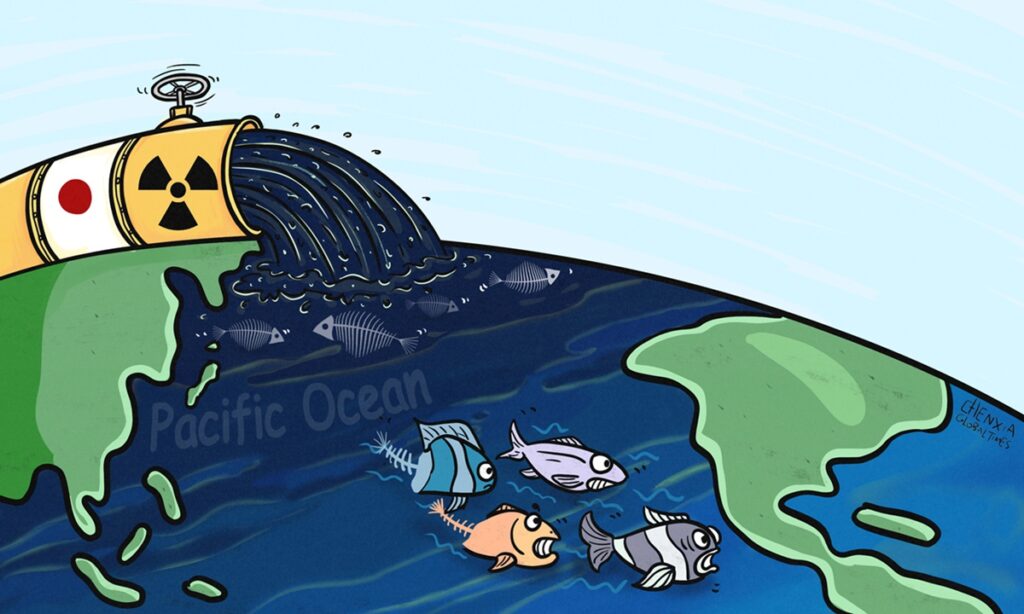Due to Japan’s claims that there have been “harassing phone calls” from Chinese numbers to Japan in the past few days, and there were reported incidents of throwing stones at Japanese institutions in China, Japanese Prime Minister Fumio Kishida said on Monday that the Japanese government had asked China to urge its citizens to act “calmly and responsibly.” The Japanese Ministry of Foreign Affairs also summoned the Chinese ambassador to Japan over the matter. Japan’s Foreign Minister Yoshimasa Hayashi said on Tuesday the harassment was “extremely regrettable and worrying,” while on the same day, Japanese Minister of Economy, Trade and Industry Yasutoshi Nishimura expressed “regret and concern” over the so-called “harassment calls.” He also said that “some calls were even going to hospitals,” and “human life is at stake now.” It must be acknowledged that many Japanese politicians are skilled at stirring up emotions.
As of August 29, it has been six days since Japan initiated the dumping of nuclear-contaminated water into the ocean. During these days, aside from continuously releasing over 1,500 tons of nuclear-contaminated water into the open sea, Japan has primarily focused its efforts on sensationalizing the issue of “safety of Japanese individuals in China.” The Japanese government’s intentions in making an issue of this matter are deviously calculated: It not only deflects blame onto China but also stages a show in front of the international community. This is aimed at shifting the international spotlight away from the issue of nuclear pollution into the sea and redirecting it toward the diplomatic dispute between China and Japan. By manipulating the narrative, Japan attempts to portray itself as a victim of Chinese bullying in order to garner sympathy. We must not allow Tokyo to succeed in these endeavors, as it would become one of the most extensive and malicious distortions of truth in human history.
Anyone with a sober mind has already seen it quite clearly: The intentions are far from pure for the Japanese side, holding a megaphone, to demand that China ensure the safety of Japanese nationals and the Japanese consulate in China, and for the Western media, particularly from the US, to follow suit by labeling the Chinese society as “anti-Japanese.”
The so-called “safety of Japanese nationals in China” is inherently a false proposition. China’s consistent stance is to legally safeguard the safety and legitimate rights and interests of foreign nationals in China. Furthermore, what incites outrage in Chinese society is Japan’s selfish act of dumping nuclear-contaminated water into the ocean, and the target is never the Japanese citizens. Tokyo is well aware of this, yet it deceptively shifts the focus of criticism from itself to ordinary Japanese citizens, attempting to stir up antagonism between the two societies. It must be said that not only is Japan dumping nuclear-contaminated wastewater into the ocean, but both some people in Tokyo and the Tokyo Electric Power Company (TEPCO) are also harboring ill intentions.
This situation also serves as a reminder that the current battle of public opinion is extremely complex. China adheres to a highly responsible attitude and adopts reasonable and moderate countermeasures. However, the Japanese side is currently exploiting the indulgence and shelter of the US and West, blatantly attempting to use this situation to execute a “Divine Reversal” technique, attempting to shift the blame onto China. Yet, the essence of this matter does not lie in the dispute between China and Japan; instead, it’s about Japan committing a harmful act against all of humanity. It must not be allowed to manipulate politics and divert international attention, thus neglecting the inherent dangers of dumping nuclear-contaminated wastewater into the sea and the historical responsibilities Japan should bear.
Therefore, we should maintain a high level of vigilance in several aspects to avoid being influenced by the Japanese side. First, we must remain vigilant against any voices or actions that attempt to shift the focus of this struggle. For 30 years, and possibly even longer, it is crucial that we consistently emphasize that this is not a dispute between China and Japan, but rather a fight to protect the rights and interests of marine ecological security. The two sides involved in this struggle are not China and Japan; instead, it is a battle between all individuals worldwide who value the environment and those entities such as the Japanese government, TEPCO, and others who pose significant environmental risks. The outcome of this struggle directly impacts the life, health and security of all of us, and it is completely unrelated to geopolitics.
Second, we must be vigilant of Japan’s attempt to create a misleading “China isolation theory” regarding the issue of dumping contaminated water into the sea. In fact, there have been unsold seafood products from the Fukushima prefecture and its surrounding areas on supermarket shelves in Japan. Fisheries have been affected, and Japanese seafood is prohibited in primary and secondary school cafeterias in South Korea. The people in neighboring countries all have strong sentiments toward the impact of nuclear-contaminated water discharge. All of these phenomena are completely disconnected from Japan’s current arrogant attitude of relying on the International Atomic Energy Agency and the US to create “international support” and shift the focus by criticizing China. No matter how Tokyo tries to confuse the public, it cannot change these facts or prevent more and more countries and people from seeing the truth.
Third, we need to be particularly cautious about remarks that incite extreme emotions in Chinese society. To put it bluntly, Tokyo hopes to see Japanese people attacked in China more than anyone else. The “1450 army” (Taiwan’s Democratic Progressive Party’s internet army), the “Great Translation Movement,” and anti-China forces in the US and the West are all closely monitoring China, not missing any opportunity they can exploit. Some people suspect that the so-called “security threats” claimed by the Japanese side may have elements of self-orchestration. In this context, we must be especially careful not to do anything that may be used against us or exploited by others.
In short, when it comes to Japan’s dumping of nuclear-contaminated water, the truth is clear – black is black, white is white, and black can never be washed white. In the face of the Japanese government’s determination to proceed with this action, we need to employ even more sophisticated fighting skills, firmly understanding the purpose and cause we are defending. We must always stand on the high ground of international justice, rendering Japan’s political tricks useless.
(Global Times)




